5 risk-increasing foods for cancer

Cancer is a serious, complex disease that can be quite difficult to manage unless diagnosed in the early stages. While people with a family history of cancer are more vulnerable, other lifestyle factors could also increase your risk of getting cancer. Our nutrition plays an important part in the growth and development of our bodies. While certain foods can protect our body from cancer, others can increase the risk of developing it.
Some foods that may increase the risk of cancer are as follows:
Processed meat
Generally, the processes that are involved in curing and preparing deli meat items involve a lot of smoking, salting, and canning. These processes lead to the development of certain carcinogenic chemicals, including N-nitroso compounds in such meats. Thus it is important to avoid consuming red and processed meats such as salami, sausage, beef jerky, corned beef, etc.
Refined sugar
Consuming foods that contain a large amount of refined sugar or refined carbohydrates can increase your risk of developing type 2 diabetes and obesity. As a result, it increases your vulnerability to inflammation and ultimately to cancers like ovarian cancer, breast cancer, and endometrial cancer. Instead of consuming such refined carbohydrates, you can switch to whole grains and more natural sources of sugars in your meals.
Fried foods
When foods are fried or cooked at higher temperatures, they develop certain harmful compounds like acrylamide that are known to be carcinogenic. Moreover, if you tend to use more oil in your cooking process, it can interfere with the amount of bad cholesterol in the body and thus lead to type 2 diabetes, obesity, and even cardiovascular issues.
Alcohol
When alcohol is metabolized in the body, it gives rise to certain chemical byproducts like acetaldehyde. This acetaldehyde is a powerful carcinogen and can also interfere with the body’s ability to fight cancerous and precancerous cells. Consuming a large amount of alcohol can increase your risk of estrogen receptor-positive breast cancer.
Overcooked foods
Meats and other similar foods, when overcooked, can release carcinogenic polycyclic aromatic hydrocarbons (PAHs) and heterocyclic amines (HCAs). Thus it is important to avoid charring or burning your foods to avoid such compounds.
Treatment methods for cancer
Different types of cancer treatments are available for patients based on how far along they are in this disease and how well their body reacts to the existing treatment. Some of the most commonly suggested treatment options for cancer include chemotherapy, immunotherapy, Chimeric Antigen Receptor (CAR) T-cell therapy, and targeted therapy with the help of inhibitors like KRAS G12C.
Common medications prescribed for cancer
In addition to the different treatment approaches, several medications are often prescribed for cancer patients. These include prescription medicines like Neulasta®, ibrutinib, and VENCLEXTA®. Such medications are prescribed in addition to chemotherapy or targeted therapy as a combination of one or more medications or a single medication.
KYPROLIS®
KYPROLIS®, which contains carfilzomib, is a prescription medication that is prescribed to patients suffering from relapsed or refractory multiple myeloma. This injection is given on its own or in combination with other medications to increase its effectiveness. The medication acts as a proteasome inhibitor and helps in slowing down the growth of cancer cells in the body. It is usually prescribed to patients who have already received one to three treatments previously for multiple myeloma.